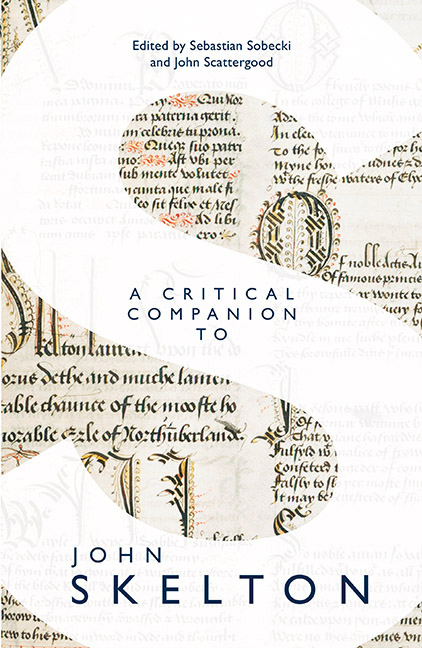Book contents
- Frontmatter
- Dedication
- Contents
- Acknowledgements
- Contributors
- Abbreviations
- Conventions
- Introduction
- 1 John Skelton (?1460–1529): A Life in Writing
- 2 Religion
- 3 Law and Politics
- 4 Classical Literature
- 5 Humanism
- 6 Satires and Invectives
- 7 Lyrics and Short Poems
- 8 Skelton's Voice and Performance
- 9 Literary Tradition
- 10 Skelton and the English Language
- 11 Skelton's English Works in Manuscripts and Print
- 12 Skelton's English Canon
- 13 Reception and Afterlife
- A Skelton Bibliography
- Index of Manuscripts
- Index of Printers and Stationers
- General Index
8 - Skelton's Voice and Performance
Published online by Cambridge University Press: 24 July 2019
- Frontmatter
- Dedication
- Contents
- Acknowledgements
- Contributors
- Abbreviations
- Conventions
- Introduction
- 1 John Skelton (?1460–1529): A Life in Writing
- 2 Religion
- 3 Law and Politics
- 4 Classical Literature
- 5 Humanism
- 6 Satires and Invectives
- 7 Lyrics and Short Poems
- 8 Skelton's Voice and Performance
- 9 Literary Tradition
- 10 Skelton and the English Language
- 11 Skelton's English Works in Manuscripts and Print
- 12 Skelton's English Canon
- 13 Reception and Afterlife
- A Skelton Bibliography
- Index of Manuscripts
- Index of Printers and Stationers
- General Index
Summary
Many of John Skelton's poems appear to be the result of expansion, addition and revision, often across many years: they accrue envoys, epilogues, epitaphs and dedicatory epistles. As a poet who both performs and repeatedly revises and expands his poems, Skelton, Seth Lerer has argued, builds a poetic world infused by ‘the fluidity of manuscript revision and public performance’ (Lerer 1993: 199). The poet apparently adapts and adds to his poems as he observes his audience's responses, the real-world audience affecting, and to some extent effecting, the fictional creation. Revision is facilitated by dissemination of the poem either in performance or in manuscript: some of Skelton's poems were printed, and there is evidence that he took interest in seeing certain poems disseminated in this way – that he circulated other poems in manuscript therefore makes his choice perhaps pointed (Edwards 2008). It is possible, as W. R. Streitberger has argued, that Skelton performed some of his poems in court ceremonies or festivals, and he was certainly involved in producing court performances of various kinds (Streitberger 2008). Only one play by Skelton survives, but there were others, and at least two further works now lost may have been pageant disguisings, a highly performative ‘mixed’ genre combining song, dance, poetry and martial display with drama: Skelton also certainly wrote a devotional poem, Vexilla regis, that ‘he devysed to be displayd’ (Streitberger 2008: 25–6). This chapter explores the ways in which Skelton deploys voices and creates audiences in his poems, and insists on and facilitates his poems’ performance.
Many of Skelton's poems include performative elements that might nudge them in the generic direction of ‘drama.’ Most obviously, the polyvocality which structures poems such as Phyllyp Sparowe and Speke Parott requires that some type of ‘performance’ be created in order for the reader to receive the poems’ meaning: if Phyllyp Sparowe were read aloud, then the words of Jane Scrope and of Dame Margery would be distinguished either through the use of different readers or, more likely, by a single reader putting on different voices. When the poem is received silently on the page, readers must ‘hear’ different voices in their heads in order to understand that poem's structure.
- Type
- Chapter
- Information
- A Critical Companion to John Skelton , pp. 114 - 126Publisher: Boydell & BrewerPrint publication year: 2018

